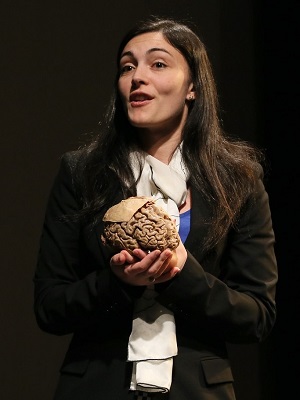Victoria Heimer-McGinn is the co-founder and co-chair of Brain Week Rhode Island. The initiative aims to share the wealth of neuroscience research that supports what is known about brain health. The 2023 edition of Brain Week Rhode Island will launch March 12 with a Brain Fair in Pawtucket. Heimer-McGinn spoke with Providence Business News about this year’s event and its focus.
PBN: How good is it to have this event back live and in person after the COVID-19 pandemic?
HEIMER-MCGINN: It’s so exciting to be back in person! We got creative during the shutdowns, and our virtual ventures were a success, but nothing compares to touching a real human brain or shaking hands with a scientist who inspires you. Our brain fairs and school visits thrive on these types of interactions and they truly make the science come alive and feel relevant for people.
And what’s most exciting is that the virtual content that we created during the pandemic has given us renewed ideas for developing our in-person programs further. For example, when we couldn’t go into schools, we created BRAINY Adventures, which are lesson plans designed to help teachers carry out DIY [do it yourself] brain science experiments with their students. During COVID, we would visit the classroom over Zoom to talk about their results once they were done. Now, we’re encouraging teachers to bring their students to the fairs and present their results to the public. This gives students the opportunity to become the teachers and increases their intrinsic motivation to pursue a career in brain science. We’re hoping that this can eventually develop into a partnership with the school departments.
PBN: What will be the focus for this year’s Brain Week?
HEIMER-MCGINN: Definitely mental health. The pandemic challenged all of us in new ways and really put into perspective the importance of social structures. The field of neuroscience has known for a long time that social interactions affect our brains. They enhance the way our neurons communicate with each other, our recovery from a range of illnesses, our ability to perform cognitively, and our ability to age in a healthy fashion.
So, it’s no surprise to us that global mental health has suffered enormously. This is why, now, more than ever, it’s important for people to understand what is happening inside their brains. It’s time to start teaching neuroscience in grade school, acknowledging the biological basis of illnesses such as addiction, anxiety and depression, and teaching people how to care for their brains.
The brain is the most important part of the body, so nurturing it through exercise, healthy eating, rest and sociality is absolutely crucial. This year Brain Week RI is really looking forward to helping people do just that.
PBN: How exactly will mental health be addressed during Brain Week?
HEIMER-MCGINN: This year’s keynote speaker will be psychiatrist Dr. Alvaro Olivares on the State of Mental Health in R.I. Dr. Olivares is chief of Kent County Memorial Hospital’s cultural psychiatric program and chief of the ECT [electroconvulsive therapy] unit at Butler Hospital, so he is ideally qualified. Dr. Olivares is also the former radio host of “Mental Health with Dr. Olivares,” which means he also understands how to communicate science effectively.
Rather than a “standard” lecture, we will chat with him in a talk show format and invite questions and comments from the audience. It will be an opportunity for people to learn about mental illness in a way that is more engaging and relevant to their own lives.
In addition, we will have shorter “Lightning Talks” on topics such as cognition in bipolar disorder, addiction, obsessive-compulsive disorder, the importance of sleep, and how the environment affects our brain.
Finally, we have invited a number of partners, from nonprofits such as Sojourner House to government entities such as the R.I. Office of Healthy Aging, to provide information on community services available to those wishing to seek help.
PBN: Brain Week officials had time during the pandemic to think more deeply about diversity, equity, inclusion and accessibility. What became of that thought process and will that be part of Brain Week this year?
HEIMER-MCGINN: As a Puerto Rican woman in science, I care deeply about increasing brain awareness among underrepresented communities. I’m also passionate about diversifying the workforce, not only because it benefits diverse communities but because it leads to better science. The scientific questions we pose are inspired by our personal journeys, so the more diverse experiences our scientists have had, the wider range of questions will be answered and ultimately benefit everyone.
Considering that the pandemic disproportionately affected Black and Hispanic communities, my team and I thought very deeply about DEI and accessibility. We made some key changes to BWRI, for example, choosing a venue in Pawtucket because it’s closer to a diverse community. Previous events were held at academic venues, which can be perceived as intimidating for some.
Additionally, we have expanded our marketing outreach to include materials and presentations in Spanish. At the Pawtucket Brain Fair, we will have official American Sign Language interpreters for the talks, as well as volunteer interpreters in Spanish, Portuguese and American Sign Language.
Finally, at the event itself, we will be live on Spanish-language radio, and audiences will be able to enjoy a Puerto Rican Carnival Parade by the Puerto Rican Institute for the Arts and Advocacy. We are really looking forward to seeing how our efforts pan out.
PBN: After the week, what, if any, other brain health advocacy will be conducted later in the year?
HEIMER-MCGINN: BWRI provides free in-classroom BRAINY visits to K-12 schools in Providence, Pawtucket and Central Falls. These are fun, interactive neuroscience lessons where we bring real human brains and let the students lead the discussion. Although we tend to concentrate these visits in the months of February and March, we will be open to requests throughout the year. Since its inception, BWRI has been to more than 30 schools and reached more than 4,000 students and we’re still growing.
The other program that we are hoping to expand is the pandemic-borne virtual talk show called Brain Talk. These were casual lunchtime chats with R.I. scientists that we aired live during the shutdown years. We have produced them and are now planning on releasing them throughout the year. Topics range from canine cognition to mental health and neuroeconomics. Stay tuned!
James Bessette is the PBN special projects editor, and also covers the nonprofit and education sectors. You may reach him at Bessette@PBN.com. You may also follow him on Twitter at @James_Bessette.












